| |
|
review | availability | |
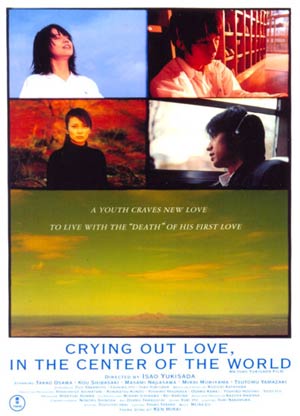
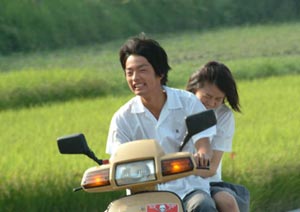
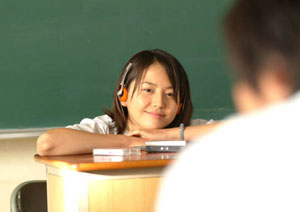
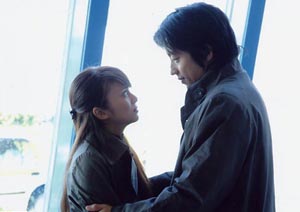
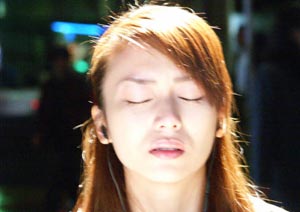
Availability:
DVD (Japan)
Region 2 NTSC
Toho
2-Disc Memorial Box
16 x 9 Anamorphic Widescreen
Japanese Language Track
Dolby Digital 5.1
Removable English and Japanese Subtitles
Various extras including a "Making of" DVD,
theme song music clip, color visual book (40 pages),
and Saku and Aki's wedding picture in a photo frame.
DVD (Korea)
Region 3 NTSC
EnterOne DVD
Boxed 2-Disc Special Edition
16 x 9 Anamorphic Widescreen
Japanese Language Track
Dolby Digital 5.1
Removable English, Korean, and Japanese Subtitles
Various extras including postcards, interviews, trailers,
TV spots, and still gallery
DVD (HK)
Region 3 NTSC
Kam & Ronson Enterprise Co, Ltd
Special Edition
16 x 9 Anamorphic Widescreen
Japanese and Cantonese Language Tracks
DTS EX, Dolby Digital EX 5.1
Removable English and Chinese Subtitles
Various Extras

|
|
Review by
Calvin
McMillin: |
When you die, does
love die, too? That's the question at the very heart
of Crying Out Love, in the Center of the World,
the 2004 box office sensation directed by Go's
Isao Yukisada. Based on the best-selling romance by
Kyoichi Katayama, the film stars Takao Osawa (Sky
High) as Sakutaro Matsumoto, a brooding thirtysomething
male engaged to the beautiful Ritsuko Fujimura (Kou
Shibasaki from One Missed Call). But the seeming
normalcy of this happy couple's life is interrupted
by an incident straight out of Haruki Murakami's best
work. While packing up boxes for a move, Sakutaro's
fiancée discovers a cassette tape. After searching
the local stores for a Walkman capable of playing
the now obsolete technology, she finally listens to
the cassette and hears a young girl's voice. Moved
to tears by the tape's content, Ritsuko promptly walks
out of Sakutaro's life, leaving him with only a cryptic
note: "I'm going away for awhile. Don't worry
about me."
Confused and unsure
of himself, Sakutaro heads to a bar to think things
over. By pure chance, he receives an important clue
to Ritsuko's whereabouts. While watching a live television
report at the Takamatsu Airport during an impending
typhoon, he sees his fiancée hobbling around
(plot point!) in the background. The location sparks
Sakutaro's memory banks, plunging the man's thoughts
backwards in time, some seventeen years ago. His current
situation, it seems, has origins in the past.
The film then shifts
perspective to 1986 with young "Saku" (now
played by Mirai Moriyama) attending the funeral of
his principal. During the ceremony, he becomes intrigued
with the student chosen to give the eulogy: Aki Hirose
(Masami Nagasawa), an intelligent "girl next
door" type with a radiant smile and personality
to match. Thanks to a seemingly chance encounter,
Aki hitches a ride on Saku's motor scooter, and immediately,
a relationship between the two soon blossoms. Not
long after, the new couple decides to enter a late
night radio contest to see who will be the first to
hear their dedication played on the air. The prize?
One brand new (for 1986 anyway) Sony Walkman offered
by the radio station. The friendly contest soon turns
sour when Saku's winning entry unintentionally offends
Aki. Too upset to tell him why face-to-face, she explains
her feelings via a cassette recording which she promptly
hands over to an apologetic Saku. The two eventually
decide to exchange tapes back and forth, telling each
other stories, asking each other questions, and generally
getting to know each other better in the face of their
somewhat restrictive teenage circumstances.
The narrative intercuts
between the past and the present as we then follow
the elder Sakutaro returning to his hometown, visiting
old haunts, and eventually finding the cassettes Aki
left for him. But it seems that Sakutaro isn't the
only one who has returned. Ritsuko, too, wanders the
same areas as her fiancé. But to what purpose?
That question is tabled until the film's final act,
but in the meantime, the audience is treated to a
refreshingly well-drawn teenage love story, albeit
one that harbors a secret.
During their adventures,
young Saku and Aki encounter Uncle Shige (Tsutomo
Yamazaki), a relative of Saku's who runs the local
photo studio. Through a series of events, they learn
the story of Shige's long lost love, a woman he planned
to marry, but didn't thanks the onset of war. But
even after she married someone else, Uncle Shige admits
that he's loved her from afar for all these years
and continues to love her even in death. Now if one
factors in the Romeo and Juliet references
and the other general hints (if not out-and-out facts)
the film drops, you're sure to figure out where this
film is headed. Yep, you guessed it: Aki is sick.
Real sick. I guess South Korea doesn't have a lock
on the terminal illness tearjerker anymore.
In an attempt to brighten
her spirits, Saku promises to take Aki to Uluru, which
she calls the "center of the world," a sacred
place she's seen only in photographs. But as she grows
sicker, will they be able to make it? And in the present
day, will Sakutaro be able to reunite with his fiancée?
The answer to both questions, it seems, resides in
the intersection between both timelines.
It's not hard to understand
why Crying Out Love, in the Center of the World
was such a box office smash. Although it certainly
plays to the melodrama crowd, the execution of the
material is head and shoulders above the kind of cloying,
overly-sentimental pap that is often associated with
the genre. That's not to say that the film doesn't
stoop to that level every once in awhile, but when
it does, it's hardly a groan-inducing moment.
If there's any major
complaint I could make about the film it would be
that it feels about ten to fifteen minutes too long.
The film drags a bit towards the end, and could have
benefited from some careful editing. Another problematic
aspect of the film is the usage of a last minute "surprise"
involving Ritsuko that, while not entirely unexpected,
is so coincidental that audiences will either love
it or hate it outright. It's a storytelling move that
could be considered alternatively clever or contrived
depending on how much goodwill the film has accrued
with the viewer up until that point. The problem with
Ritsuko's connection to Saku's past is that it immediately
resolves the problem of her having to deal with Saku's
old relationship, recasting it in a different light
that immediately glosses over the jealousies and insecurities
that one might expect a woman in Ritsuko's position
to feel, especially when she's "competing"
with someone who was quite obviously the love of Saku's
life. The revelation also opens a proverbial can of
worms in terms of understanding Ritsuko's motivations
for dating Sakutaro in the first place, not to mention
her eventual decision to marry him. The film doesn't
dwell on this aspect, and its decision to distract
its viewers from even thinking about it, suggests
that they don't want you to dwell on it either. The
plot point doesn't undermine the entire film, but
it is problematic nonetheless—which may be why
it's not in Katayama's original novel.
Although Takao Osawa
and Kou Shibasaki are competent in the lead roles,
the fate of the film really hangs on the performances
of the two young actors, and they both pull through
magnificently. As the less interesting half of the
happy couple, Mirai Moriyama does a fine job as the
young Saku. He uses his unique manga-character mug
to great effect for scenes of comedy, romance, and
tragedy, imbuing his character's journey from awkward
teen to mature adult with a surprising sense of realism.
Masami Nagasawa is a revelation as Aki Hirose, and
a fine choice to play a character who so effectively
changes her loved one's life. Able to convey intelligence,
humor, and grace in the early going, Nagasawa is a
charming screen presence, able to change the tone
of scene with little more than a smile. The romance
presented here is of the chaste variety, and although
some may question the believability of such a thing
in the face of impending doom, the actors pull it
off extraordinarily well. If anything, this movie
is an old fashioned romance made relevant for a contemporary
audience.
Ultimately, Crying
Out Love, in the Center of the World is a film
that celebrates the bloom of youth and the thrill
of first love. Even so, the film isn't just about
nostalgia, but about finding peace and starting over.
In a world where real closure is hard, if not impossible
to find, the bittersweet Crying Out Love, in the
Center of the World provides it in spades. If
liking this movie makes me a sentimental fool, so
be it. (Calvin McMillin, 2005)
|